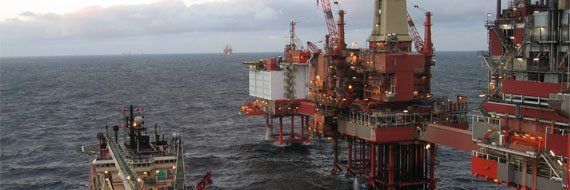Project Management
Throughout all project stages, from inception to completion
Noble Offshore’s team brings robust project management methodology into the definition, design, specification, construction monitoring, procurement, regulatory interfacing, quality control and assurance of onshore, offshore and marine oil and gas assets.
Seven Phases in Life
“The buzzword here is the project lifecycle,” says Porter. “Most of our project managers are experienced and have been through the entire project lifecycle numerous times, so they understand the process from conception through to commissioning and start-up and handing the keys over to the customer.”
One of the advantages of Noble Offshore’s project management division is that it can support the different phases of a capital project from concept identification all the way through to abandonment. Porter explains: “A capital project typically has six or seven phases throughout its life, and we can provide a project team with different managers and key personnel transferring in and out to best suit the needs of the project at each phase. Project involvement can range from a few months to several years depending on the scope of the project.”
Furthermore, with a strong project team on board, the wider services of Noble Offshore can be called upon whenever necessary. Porter notes, “You can pull in other group services, not just project management. For example, in the early stages we can mobilise our field development expertise, and in later stages provide ongoing asset integrity skills.”
Noble Offshore’s deep technical resource pool provides a strong additional capability for the client. “We have the skills to manage the project but we can also provide the technical know-how and all the support functions, the cost monitoring, forecasting, and scheduling,” says Porter.
Cost-effective Consultancy
It can also add value where it really matters – on the bottom line. One client managed to obtain some significant cost savings by deploying Noble Offshore’s project management services.
Porter takes up the story: “The client was going to buy a floating production, storage and offloading (FPSO) unit. We scratched around and found out about the tax ramifications and told the client he could lease the FPSO which would be a cheaper option as he wouldn’t have to pay any import tax. Somebody else built it and leased it to them.”
One of the key value add-ins is interface management – the links in the chain where the “handoff” takes place between different parts of the organisation, or between different companies involved in a project. “Typically, engineering houses know their business pretty well, vendors know their product lines pretty well, fabricators know how to fabricate – all the specialists know their craft, but it’s the interface or the handoff where things fall apart, or where the schedule disconnects. The interface is a typical failure point,” says Porter. With its strengths across the value chain, project management services can step in to smooth over any cracks at these interface points.
Upcoming Challenges
As the oil and gas market evolves, Porter’s team will have to respond to a growing list of challenges. One of these is the chronic manpower shortage facing the industry. The oil and gas “patch” has failed to attract sufficiently skilled people to the business in the last few years. The generation that built the North Sea, expanded the Middle East and developed the US, Brazilian and Angolan deep waters, is nearing retirement age. There’s a void of longer term experience that will need to be filled, particularly with projects becoming more technically challenging, or located in deeper water and in more hostile environments like the Arctic.
As the scale of the challenge grows, project management services will remain in strong demand as clients look to Noble Offshore to provide a seamless service that minimises project dependencies and reduces potential risks.
“As the physical and financial scale of projects steps up, we will need to have more sophisticated management tools,” says Porter. “We also have to be flexible, and adapt. We’ve gained experience from projects all over the world, and we’re pretty flexible. There’s no ‘one-size fits all’ approach. We apply the size that each individual job needs.”
